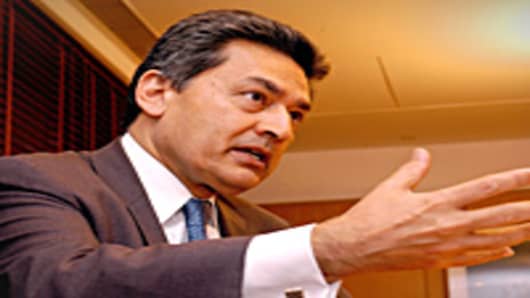The SEC says Gupta tipped Rajaratnam about Warren Buffett’s Berkshire Hathaway’s $5 billion investment in Goldman and Goldman’s upcoming public equity offering before that information was publicly announced on Sept. 23, 2008. Gupta allegedly called Rajaratnam immediately after the board conference call, just a few minutes before the market closed. Rajaratnam must have been prepared to move, because within one minute he had arranged for Galleon funds to purchase more than 175,000 shares of Goldman, according to the SEC. Rajaratnam even had time to spread the tip to another trader, who also bought shares of Goldman. The news became public at 6 p.m. that day. The next day, Rajaratnam sold the shares for a $900,000 profit.
While it’s shocking that this information was allegedly coming from a Goldman board member, we’ve long known that something along these lines had to have happened. The day after the Goldman-Buffett deal was announced, Reuters reported that the pervious day saw an unusual surge in Goldman Sachs share price in the last 10 minutes of trading.
Here’s what Reuters reported on September 24th, 2008:
Just before 6 p.m. EDT, Goldman Sachs said it would get a $5 billion investment from Buffett's Berkshire Hathaway Inc (BRKa.N) (BRKb.N), which investors welcomed as a much needed vote of confidence in the bank.
Goldman's shares have since risen about 6 percent. If someone with inside knowledge of the deal was snapping up the bank's shares they would have made a significant, and illegal, profit.
"Someone is going to get caught, because that is easy to track, they can find out who did that," said Rovelli.
Goldman Sachs' stock rose from $119.53 at 3:50 p.m. to $125.05 at the close. The S&P financials sub-index meanwhile fell from 273.79 to 273.61 in the same time frame.
"That share move at Goldman was a clear outlier. It got everybody's attention. It was clear that there was something specific going on in that stock that wasn't going on in any other stock in that space," said Peter Kenny, managing director at Knight Equity Markets in Jersey City, New Jersey.
The charge is the latest to come out of a long-running crackdown on insider trading by federal authorities. SEC has previously charged Rajaratnam and others in an insider trading scheme involving the Galleon hedge funds. Gupta’s status as a board member of Goldman and P&G makes him the highest ranking person charged in the crackdown.
Word that investigators were focusing on Gupta was reported back in April by the Wall Street Journal’s Susan Pulliam in April 2010.
Goldman's name emerged in a government letter listing companies whose trading, by Mr. Rajaratnam and others in the Galleon case, the U.S. is investigating. The March 22 letter said the government is scrutinizing trades by Mr. Rajaratnam and others in Goldman Sachs from June 2008 through October 2008, a time when Goldman shares gyrated amid the bankruptcy of Lehman Brothers Holdings and concerns about the future of all major investment banks.
As part of that focus, the government is examining whether Rajat Gupta—a current Goldman director, former head of McKinsey & Co. and close associate of Mr. Rajaratnam's—shared inside information about Goldman, the people close to the situation say.
Shortly before that report, Gupta announced he would step down from the Goldman board to pursue "other commitments."
So the SEC has apparently now unraveled the mystery of those trades, which we knew to be shady over two years ago. Nonetheless, the fact that a board member was giving away this information to his hedge fund friend is shocking. It will confirm for critics of Wall Street that the game is badly rigged.
________________________________________
Questions? Comments? Email us atNetNet@cnbc.com
Follow John on Twitter @ twitter.com/Carney
Follow NetNet on Twitter @ twitter.com/CNBCnetnet
Facebook us @ www.facebook.com/NetNetCNBC



